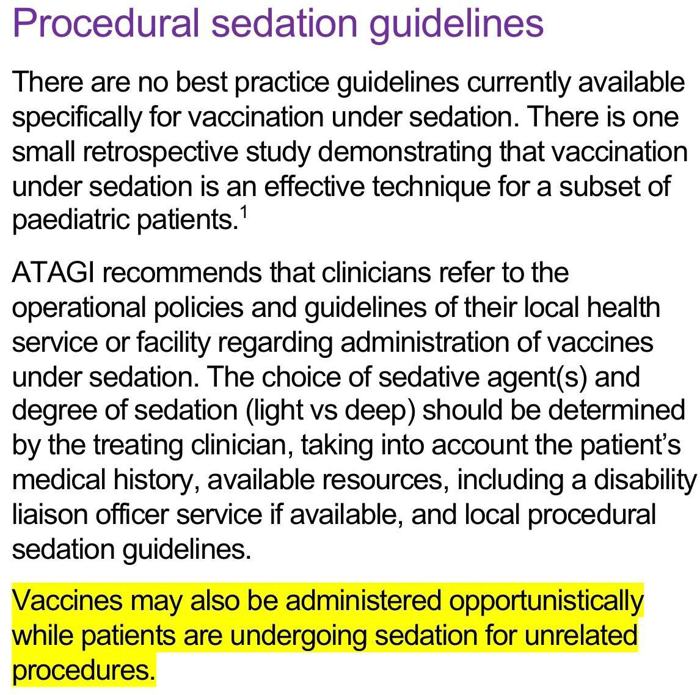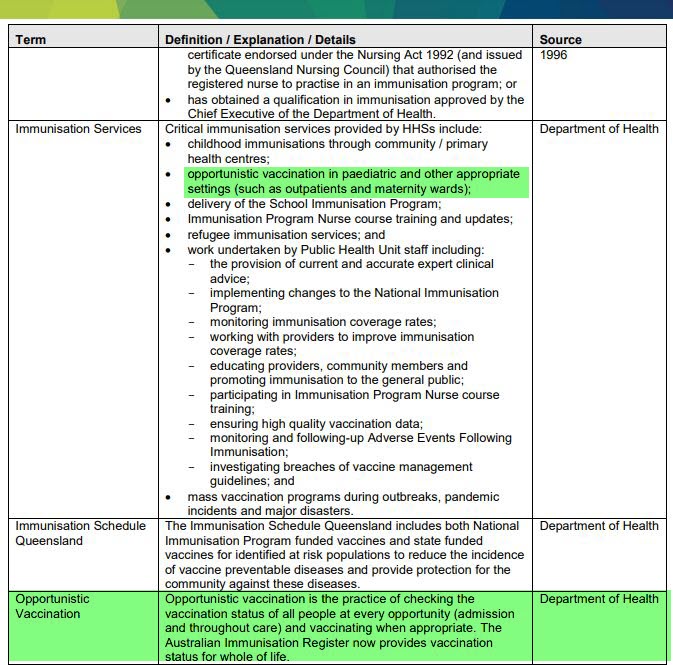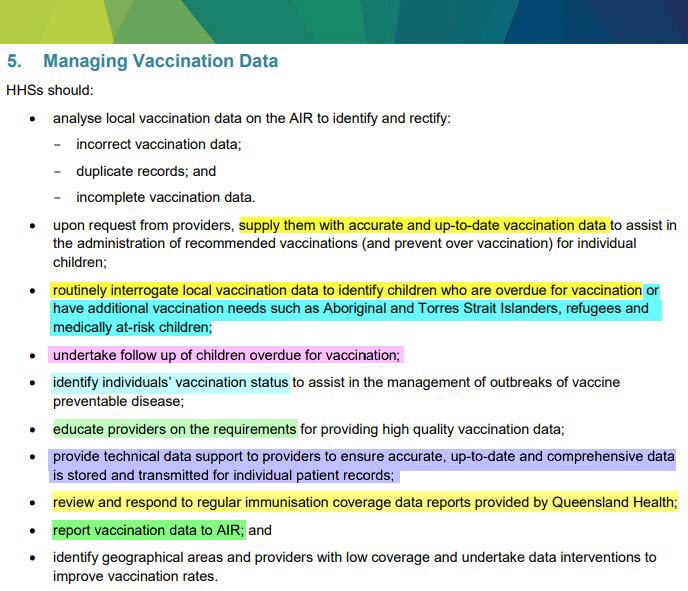“Opportunistic Vaccinations”
- Updated:2 years ago
- Reading Time:9Minutes
- Post Words:2154Words
For anyone that knows about Democide and #WHO-lockstep this Opportunistic Vaccinations & Sedation rules are horrifying. This is how we kill off/control the planet and get our own schools, hospitals, and so-called health professionals to do it on our behalf.
See also “WHO ‘Decade of Vaccinations’ and what they are currently planning. WHO = NWO-controlled.

ATAGI stating “Vaccines may also be administered opportunistically while patients are undergoing sedation for unrelated procedures.” – April 6, 2022
Safety of COVID-19 vaccines under sedation, including co-administration with other vaccines
ATAGI considers all COVID-19 vaccines currently registered in Australia to be safe and suitable for administration under sedation. Vaccines can be administered under any type of sedation (i.e. conscious or deeper sedation).
“ATAGI considers all COVID-19 vaccines currently registered in Australia to be safe” (ARE YOU FRIGGIN’ SERIOUS?)).. or maybe… they are being serious… since there are “NO” currently registered COVID-19 vaccines? (Since it’s still only authorized under Provisional (Emergency) use only and not actually approved… and still “experimental” and … still in Clinical Trial…) Are they just playing on words or are they just ignorant to the safety, or are they complicit?
While there are no data on the safety of specific sedative agents given concurrently with any specific vaccine, there are also no theoretical safety concerns. There are no theoretical concerns regarding immunogenicity or effectiveness of COVID-19 vaccines if administered under various methods of sedation.
” there are no data on the safety”… (so let’s do it anyway because there are no “theoretical” safety concerns? WTF?)
There are no concerns about the safety of COVID-19 vaccines if administered following use of various medications beyond the safety and risk of sedation itself.
WOW what planet are these guys on?
COVID-19 vaccines can be co-administered with other vaccines if required, including influenza and routine childhood and adolescent vaccines (refer to ATAGI clinical guidance for COVID-19 vaccine providers).
COVID-19 vaccines can be co-administered with other vaccines (What Democide looks like in print.)
There is limited evidence on the safety and effectiveness of co-administering COVID-19 vaccines at the same time as other vaccines. Providers need to balance the opportunistic need for co-administration with the benefits of giving the vaccines on separate visits.
Um… there is limited evidence on the safety and effectiveness of EVERYTHING to DO with COVID-19 Vaccines!!! Actually other than the news and TGA, there is barely a single bit of evidence to show they are safe OR effective OR even Necessary!!
Procedural sedation guidelines
There are no best practice guidelines currently available specifically for vaccination under sedation. There is one small retrospective study demonstrating that vaccination under sedation is an effective technique for a subset of paediatric patients.
no best practice guidelines.. #democide
ATAGI recommends that clinicians refer to the operational policies and guidelines of their local health service or facility regarding administration of vaccines under sedation. The choice of sedative agent(s) and degree of sedation (light vs deep) should be determined by the treating clinician, taking into account the patient’s medical history, available resources, including a disability liaison officer service if available, and local procedural sedation guidelines.
Vaccines may also be administered opportunistically while patients are undergoing sedation for unrelated procedures.
Read that one again: Vaccines may also be administered opportunistically while patients are undergoing sedation for unrelated procedures. Since most of the injuries caused by these shots occur within 24hours, and sometimes within minutes, we could just blame the “unrelated” procedure when SHTF administering these toxic injections… #brilliant #democide101
Vaccination under sedation may not be available for all ages in all states and territories. ATAGI recommends that state and territory health departments and specialist immunisation services be consulted to review the available services in their jurisdiction and ensure that sedation for vaccination is accessible for patients who require it.
Since these jabs are USELESS at preventing infection, hospitalizations or deaths, and are causing unknown but monumental amounts of harm along with worsened immune systems – I would query the use of “who require it”.
Post-vaccination observation
All patients who undergo sedation for vaccination require careful observation in the post-vaccination period, ensuring recovery from the sedative agents used and to detect any potential immediate adverse events relating to the vaccine (minimum 15 minutes observation). The period of observation varies depending on choice of sedative(s) and local procedural sedation guidelines.
Risks and benefits of opportunistic vaccination during sedation for an unrelated procedure
Opportunistic vaccination during an unrelated elective procedure undertaken under sedation or anaesthesia may be appropriate for some patients and should be strongly promoted when possible as it could avoid the need for a separate episode of sedation.
Yes, strongly promoted. #Democide101
Opportunistic vaccination should only be considered during elective procedures where the patient is not acutely unwell.
What could possibly go wrong?
Immunisation providers and the clinicians responsible for the procedure should be aware of the following:
- attribution of adverse events may be more challenging following vaccination during an unrelated procedure, for example, it may not be appropriate to provide COVID-19 vaccination during major surgery for an acutely ill patient
- overlapping adverse effects may increase discomfort for the patient (e.g. fever, muscle aches, joint pain after vaccination)
- the inflammatory responses and fever elicited by vaccines may interfere with the postoperative course.
attribution of adverse events may be more challenging following vaccination during an unrelated procedure IS the REASON you are Approving this ridiculous advice. COME ON PEOPLE. WAKE UP.
Although surgery and anaesthesia are associated with transient (approximately 48 hours) immunomodulatory effects, these are not anticipated to interfere with an effective immune response to vaccination.
Lets talk about this effective immune response in another context… we really need to investigate your goddamn brain. Your body – which heals itself / is the one doing all the work. Adding additional “components” and “complications” and “injury” and “things that illicit an immune response” to someone already being “damaged” by your surgery/procedure – is adding to what the body has to do to repair itself. Done with you fkn genocidal morons.
The “School of Population Health” – University of NSW, published an article in Jan 2021 to the journal “Vaccine” titled “A review of hospital-based interventions to improve inpatient influenza vaccination uptake for high-risk adults” (Click image below).
Conflict$:
- Author Holly Seale:
- receives funding from Sanofi Pasteur – “the vaccines division of the pharmaceutical company Sanofi – the largest company in the world devoted entirely to vaccines“. (01) Sanofi Pasteur – https://en.wikipedia.org/wiki/Sanofi_Pasteur
- presents at conferences & workshops & develops resources for: Sanofi Pasteur and:
Sequiris – the World Leader in Influenza Vaccines! one of the largest flu vaccine makers in the world. including their own new sa-mRNA (self-amplifying flu vaccines), as well as the controversial Quadrivalent flu vaccines, and owns the only influenza vaccine manufacturing facility in Australia and is the world’s only manufacturer of local antivenoms. (02) Sequirus – FDA – Flucelvax Quadrivalent – https://www.fda.gov/vaccines-blood-biologics/vaccines/flucelvax-quadrivalent Sequirus.com “Our Products” https://www.seqirus.com/products )) (Sequeirus – “About us” > “Manufacturing” https://www.seqirus.com/manufacturing/global-manufacturing-network ))
GSK – “THE MANUFACTURER of Influenza Vaccines! Including the controversial trivalent & quadrivalent flu vaccines” as well as one of the largest vaccine companies in the world developing vaccines all the Infant, Adolescent, Traveller, and Adult vaccines in 160 countries! (03) GSK – FDA – Fluarix Quadrivalent – https://www.fda.gov/vaccines-blood-biologics/vaccines/fluarix-quadrivalent (04) GSK – gsk.com “Our vaccines” https://www.gsk.com/en-gb/products/our-vaccines/
Methods: A search was conducted using Scopus, Embase and PubMed databases for articles reporting on hospital-based interventions aimed at improving influenza vaccination for adults. Studies published in English were included and descriptively analysed.
(“we searched for publications, reviewed 31 of them from 1983-2017, and only 3 articles reported no significant increase in uptake attributed to patient refusals, and so we conclude — that “hospital-based interventions are an effective means of improving opportunistic inpatient vaccination“)
Queensland Health “Opportunistic Vaccination.”

Queensland
This Guideline provides information for all Queensland public health system employees (permanent, temporary and casual) and all organisations and individuals acting as its agents (including Visiting Medical Officers and other partners, contractors, consultants and volunteers).
School Immunisation Program
The Department will provide funding to the HHS for delivery of the School Immunisation Program (SIP).
- ensure the necessary assets, equipment, materials, services and staff (eg. purpose-built vaccine refrigerators, vehicles, coolers/portable fridges, resuscitation equipment and disposables) are available to deliver the SIP effectively and efficiently; (setup Democide in schools)
- ensure SIP service providers comply with the Immunisation Schedule Queensland, the current online edition of the Australian Immunisation Handbook, current Queensland’s Health (Drugs and Poisons) Regulation 1996, the Department’s SIP Resource Kit for Vaccine Service Providers and the National Vaccine Storage Guidelines; (get up-to-date brainwashing handed-down from WHO)
- ensure “catch-up” vaccination services to students who missed school clinics are offered in various settings including schools and community health/immunisation clinics;
- ensure vaccination records and consent forms are kept in accordance with the Queensland Health (Clinical Records) Retention and Disposal Schedule;
- record and send all required SIP data to the Australian Immunisation Register (AIR) within four weeks of an individual being immunised through the SIP; (digital health coming to your social credit system soon, so keep your records so that we can use this against them later)
- participate in regular communication with the Immunisation Program, Department of Health, including, but not restricted to: bi-monthly teleconferences; scheduled video conferences; face to face and other incidental meetings as required; (get up-to-date brainwashing handed-down from WHO)
- manage clinical incidents and adverse events; and (wow… detailed… )
- work with the Department of Health to:
- improve immunisation coverage rates for the SIP; and (get em all!)
- improve program delivery
HHSs should:
- analyse local vaccination data on the AIR to identify and rectify:
- incorrect vaccination data;
- duplicate records; and
- incomplete vaccination data.
- upon request from providers, supply them with accurate and up-to-date vaccination data to assist in
the administration of recommended vaccinations (and prevent over vaccination) for individual
children; - routinely interrogate local vaccination data to identify children who are overdue for vaccination or
have additional vaccination needs such as Aboriginal and Torres Strait Islanders, refugees and
medically at-risk children; (hassle them for jabs, and wtf re Aboriginal & Refugees?) - undertake follow up of children overdue for vaccination; (hassle ’em)
- identify individuals’ vaccination status to assist in the management of outbreaks of vaccine
preventable disease; - educate providers on the requirements for providing high quality vaccination data; (keep the brainwashing going)
- provide technical data support to providers to ensure accurate, up-to-date and comprehensive data
is stored and transmitted for individual patient records; (digital health will ensure your medical records follow you around – even to your local store, services, and any business who gets brainwashed to comply with draconian dictatorship from the NWO) - review and respond to regular immunisation coverage data reports provided by Queensland Health; (get your latest brainwashing from WHO)
- report vaccination data to AIR; and (digital Health records)
- identify geographical areas and providers with low coverage and undertake data interventions to
improve vaccination rates (hmm, data interventions, what does that mean?)
- ATAGI advice on use of sedation for CVODI-19 Vaccination, Apr 6, 2022 (Docx) “Vaccines may also be administered opportunistically while patients are undergoing sedation for unrelated procedures.” (05)ATAGI advice on use of sedation for COVID-19 vaccination – 6 April 2022: “Vaccines may also be administered opportunistically while patients are undergoing sedation for unrelated procedures.” (Docx) … Click for full citation
- A review of hospital-based interventions to improve inpatient influenza vaccination uptake for high-risk adults (NSW ‘School of Population Health’, Dec 2020) (PubMed) (06) McFadden K, Seale H. A review of hospital-based interventions to improve inpatient influenza vaccination uptake for high-risk adults. Vaccine. 2021 Jan 22;39(4):658-666. doi: 10.1016/j.vaccine.2020.12.042. Epub 2020 Dec 21. PMID: 33357955.
- Queensland Health Guideline Approval date: 25 June 2019 (PDF) Document Number: QH-GDL-955:2014 (07) Queensland Health Guideline Approval date: 25 June 2019 (PDF) Document Number: QH-GDL-955:2014 https://www.health.qld.gov.au/__data/assets/pdf_file/0026/147545/qh-gdl-955.pdf

Site Notifications/Chat:
- Telegram Post Updates @JourneyToABetterLife (channel)
- Telegram Chatroom @JourneyBetterLifeCHAT (say hi / share info)
- Gettr Post Updates @chesaus (like fakebook)
Videos:
References[+]
Truth-seeker, ever-questioning, ever-learning, ever-researching, ever delving further and deeper, ever trying to 'figure it out'. This site is a legacy of sorts, a place to collect thoughts, notes, book summaries, & random points of interests.
DISCLAIMER: The information on this website is not medical science or medical advice. I do not have any medical training aside from my own research and interest in this area. The information I publish is not intended to diagnose, treat, cure or prevent any disease, disorder, pain, injury, deformity, or physical or mental condition. I just report my own results, understanding & research.






![N.I.C.E way to Cure COVID-19 [Book Notes]](https://pennybutler.com/wp-content/uploads/2021/05/nice_cure_booknotes-777x437.jpg)

![“If vaccines aren’t the answer, what can I do to protect myself?” [Dr Andrew Kaufman]](https://pennybutler.com/wp-content/uploads/2023/02/AndyKaufman-DanDicks-Feb2023-777x437.jpg)